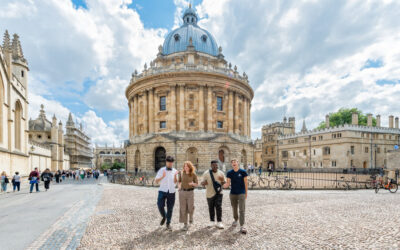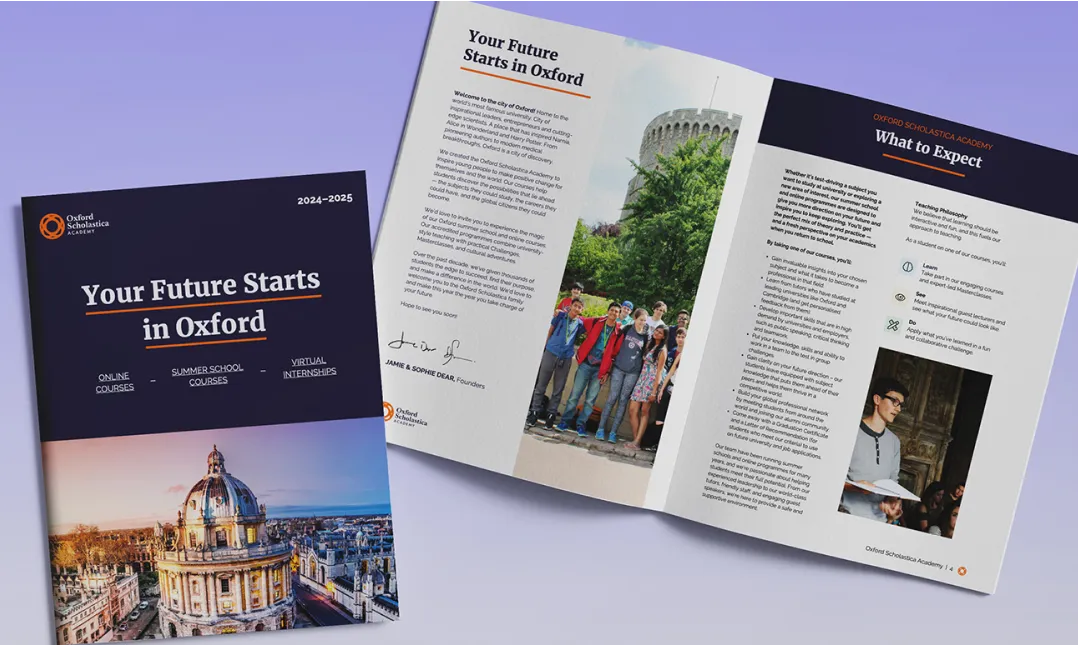Education and teaching degrees shape the minds of future generations and contribute to the development of society by ensuring that skills, knowledge, thoughts and behaviours answer to the needs and values of society as it changes.
What Is an Education & Teaching Degree?
An education and teaching degree provides the pedagogical training needed for students to become effective educators, whether at the primary, secondary or higher education levels.
Moreover, there’s a great diversity of education and teaching degree options available, and depending on your goals, various specific programmes can align with your individual career aspirations. Our free Career Test is a great starting point for reflecting upon your personal professional goals.
With that in mind, this helpful guide will help you get started on your journey.
What Will I Learn Studying Education & Teaching?
I. Foundations of educational theory
In any education or teaching degree, you’ll explore the theoretical underpinnings of education, covering educational psychology, learning how people learn and develop, and exploring theories like:
- Behaviourism. The belief that human behaviour is learned through conditioning, where external stimuli shape an individual’s response.
- Constructivism. The theory that people build knowledge through experiences, interactions and reflections.
- Socio-cultural learning. The suggestion that social interactions, language and cultural tools play an important role in cognitive development.
This will help you to gain a strong foundation of educational theory to take with you into the classroom.
II. Effective classroom management
In addition to covering a lot of theory, an education and teaching degree provides students with the knowledge to maintain a well-managed classroom.
For example, this could include strategies for establishing a positive classroom environment, handling discipline issues and fostering positive relationships with learners. Ultimately, gaining awareness and understanding of effective classroom management can help to create an ideal environment for learning.
III. Curriculum development and instruction
Education and teaching students also practise designing effective curriculums that align with learning objectives, planning engaging and informative lessons, and employing a variety of teaching methods to meet the diverse needs of individual learners.
IV. Assessment and evaluation
Finally, studying for an education and teaching degree not only provides crucial experience in evaluating learner performance but also equips you with the skills to use a variety of assessment methods, from quizzes and tests to portfolios and projects.
Moreover, you’ll learn how to achieve fair and unbiased evaluation, while also understanding the role that assessment plays in informing instruction and tracking student progress.

Choosing an Education & Teaching Degree
Choosing the degree that’s right for you is an important step in your career journey. It’s a good idea to start reflecting on your interests and passions to guide your choice.
Consider the following questions to help determine your teaching interests:
- Which age group do you prefer to work with?
- Which subjects or fields are you most passionate about?
- What are your career goals in education?
- Which teaching methods appeal to you?
- What are your strengths and skills?
- Do you have a high tolerance for change and adaptation?
- What impact do you want to have?
- Do you enjoy lifelong learning?
Alongside your reflections on these questions, you should also consider things like course structure and content, faculty and resources, opportunities for practical experiences and personal preferences in location and university size.
9. Education & Teaching Degrees to Consider
Here are nine of our top education and teaching degrees to consider:
1. Master of Primary Education (MEd), University of Cambridge, UK
As one of the top-ranked universities in the world, the University of Cambridge offers a prestigious Master of Primary Education programme.
Through this programme, students study a comprehensive curriculum that prepares them to become primary school teachers. Specifically, the course content includes aspects of child psychology as well as the practical theory of learning development techniques.
If you’re interested in expanding your knowledge of psychology to complement a career in education, find out more about our summer Psychology & Neuroscience course.
Furthermore, the University of Cambridge has a longstanding reputation for producing skilled and innovative educators, working at the forefront of developing and testing new approaches to primary education to ensure the best for future generations.
2. Master of Arts in Teaching (MAT), Stanford University, USA
Stanford’s Master of Arts in Teaching Programmes are renowned for their commitment to educational excellence. Stanford fosters a supportive learning environment and has strong connections with local schools for practical experiences.
While providing a firm basis in the latest teaching skills and approaches, the programmes also encourage specialised study with a focus on advanced teaching methods, curriculum development and classroom management.
Specialisations include ‘Education Data Science’, ‘Learning Design and Technology’ and ‘International Comparative Education’. This rigorous approach produces some of the best educators in the world.
3. Master of Science in Education (MSc), University of Oxford, UK
Famed for its academic excellence, the University of Oxford offers a prestigious MSc in Education, focusing on preparing students to become teachers with a strong theoretical foundation in the latest pedagogical techniques and approaches.
Moreover, students can choose from specialisations such as ‘Comparative and International Education’ and ‘Digital and Social Change’, allowing them to address the evolving needs of teaching and learning in the modern world.
The University of Oxford’s rich history and dedication to education research gives this degree a widely respected status around the world.
Please note: Oxford Scholastica is not officially affiliated with any UK universities, including the University of Oxford.
4. Bachelor of Science in Education (BSEd), University of Michigan, USA
The Bachelor of Science in Education programme at the University of Michigan prepares students to teach in elementary schools, and is renowned for its commitment to educational research and innovation.
The degree provides a comprehensive programme to give teachers a wide skill set, preparing them to teach in any area. It’s particularly respected for its focus on STEM education, with options such as ‘Quantitative Physical Science’, ‘Earth Systems Science’ and ‘Foundations of Astronomy’.
The University of Michigan also has a strong alumni network and lots of career support services to help you get practical work experience and eventually find a permanent teaching position.
5. Bachelor of Education (BEd), University of Auckland, New Zealand
The University of Auckland is known for its commitment to early childhood education. Its Bachelor of Education programme prepares students to become early childhood educators, helping young children with their learning and exploration of the world around them.
There’s a particular emphasis on the role of teachers as advocates and supporters of minority identities, as well as relevant pedagogical theories that support this.
Additionally, the course provides plenty of practical experience, giving students the opportunity to develop their skills alongside practising professionals.
6. Master of Education (Ed.M.), Harvard University, USA
The Master of Education course at Harvard builds on over a century of innovation and dedication, providing the basic skills and forward-thinking specialisms that help students to make an impact in education and drive educational change outside the classroom.
Specialisms include ‘Education Policy and Analysis’, ‘Teaching and Teacher Leadership’ and ‘Human Development and Education’.
The Graduate School of Education offers the Ed.M. in both online and residential formats, making it accessible for a wide range of aspiring teaching professionals and a great place to start networking with like-minded colleagues.
7. Master of Secondary Teaching (MAT), University of Melbourne, Australia
The Master of Secondary Teaching at the University of Melbourne is a continuation of an initial undergraduate degree and prepares students to teach ages 12-18 years.
Melbourne offers a unique curriculum and partnership model, where you’ll become an active member of a school or early childhood community as part of your course. This combination of theory and hands-on practice will enable you to begin your career with confidence.
The course is designed not just for teaching, but also other career areas like children’s services coordination and education research.
8. Bachelor of Secondary Education (BEd), University of British Columbia, Canada
Known for its inclusive education approach, the University of British Columbia offers its Bachelor of Secondary Education students courses in special education. These include ‘Family-Centred Practice’, ‘Sign Language Studies’ and ‘Classroom Management’.
Reflecting the university’s commitment to creating inclusive and supportive learning environments, this degree prepares students to support learners with diverse needs and disabilities in a range of settings.
9. Bachelor of Science in Elementary Education (BSEd), University of South Florida, USA
The Bachelor of Science in Elementary Education at the University of South Florida equips students with the skills needed to become effective elementary school teachers. Through a focus on inquiry, inclusion and innovation in teaching, the programmes ensures graduates are well-prepared for their future in primary education.
Additionally, there’s a particular emphasis on arts-integrated education, using teaching methods that incorporate elements of the arts to meet the needs of diverse learners.
The university also partners with selected local schools so that students can apply what they learn and undertake action-based research projects.
These degrees all focus on preparing future education professionals to provide cutting-edge learning expertise in supportive and inclusive environments, guiding the next generation as they learn, shape their identities and explore the world.

By Alice Spiers
Alice is a historian at St Anne’s College, University of Oxford, where she teaches undergraduate history, predominantly medieval history and historiographical theory. She is also a freelance writer and editor, and a research assistant at the Leverhulme Centre for Demographic Studies.






